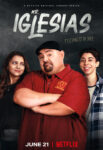 The COVID-19 quarantine is affecting all of our lives in both big and small ways, and sometimes in ways we never expected. One of those ways is in the dearth of new movies that interest both Eve and I and are appropriate for our Are You Just Watching podcast. The industry has been releasing less and less to market. What they have been releasing seems to be much more artistic, with less than normal general appeal. To try and mix it up a little, for this month’s episode, Eve and I take a break and discuss what we watch for our own entertainment, why we watch what we watch, and how we try to apply the principles of Christian critical thinking that we espouse on the show.
The COVID-19 quarantine is affecting all of our lives in both big and small ways, and sometimes in ways we never expected. One of those ways is in the dearth of new movies that interest both Eve and I and are appropriate for our Are You Just Watching podcast. The industry has been releasing less and less to market. What they have been releasing seems to be much more artistic, with less than normal general appeal. To try and mix it up a little, for this month’s episode, Eve and I take a break and discuss what we watch for our own entertainment, why we watch what we watch, and how we try to apply the principles of Christian critical thinking that we espouse on the show.
Join us, then, for an inside look at the viewing habits of Eve Franklin and Tim Martin. Therapy costs not included!
When Eve and I prep for a show, to take one of Hollywood’s offerings and try and look at it through the lens of scripture, sussing out what messages might be hidden in the story, we will often watch the content two or three times, taking notes. We then put in a fair amount of work to do the analysis and break it down into content that we sincerely hope you all enjoy. We enjoy doing the show and both feel called to do so. Yet, it’s not all fun and play. We do important work for a boss whom we love dearly.
I’m sure you’d not be surprised to learn that we don’t do shows on everything we watch. Like everyone else, we sit down and relax with the shows that take our fancy. Sure, Eve and I have some overlap in our viewing preferences, but more than a few differences too. And when we watch to entertainment, we don’t just turn off our brains, and neither should you! Every single image that slashes across your screens is there to spread a message, support an idea, and—most importantly— make money. When you lower your defenses, those ideas are like seeds that can take unexpected root, sprouting into invasive weeds that can be difficult to remove.
It’s not easy to do, but Eve has written a book, called Are You Just Watching?: The Entertained Christian’s Handbook to Consuming Media with Purpose that is designed to work in harmony with our podcast. It has stories, instructions, analysis, and worksheets that are designed to help us all improve our critical thinking skills when it comes to media consumption.
What We Like, and Don’t
When it comes to watching, Eve is far more capable than I am at dividing her attention between a task at hand and a program on the television. As a general rule, she likes character-driven content where she can invest in the character and really sympathize with them. Crime dramas (with a twist) often fall into this category. Shows like Leverage, The Mentalist, NCIS, and NUMB3RS are all among show’s she’s invested time in. She also likes reality shows with a natural theme, like offerings by National Geographic and shows that follow veterinarians and the troubles they face in their practices. Of course, much like me, Eve loves good science fiction and fantasy, having been introduced to the genre, like so many of us, by C. S. Lewis’s Chronicles of Narnia. Unfortunately, though not surprisingly, even our stalwart go-to of sci-fi and fantasy are using their platform more and more to range further and further from the moral teachings of God’s word.
While Eve is unconsciously filtering her content, I find that I have to consciously steer away from offerings that I am vulnerable to, one way or another. To try and stay sexually faithful, I find that I have to avoid shows with excessive skin, like Amazon’s The Boys, or HBO’s Game of Thrones or Westworld. While these are concepts that I know interests me, their presentation seeks to pull me further from God. For Eve, HBO’s True Blood was the same hurdle.
Finally brothers and sisters, whatever is true, whatever is honorable, whatever is just, whatever is pure, whatever is lovely, whatever is commendable—if there is any moral excellence and if there is anything praiseworthy—dwell on these things. (Philippians 4:8)
For me, I like coming-of-age stories that feature an underdog child who grows into great power and responsibility. Like Eve, I enjoy crime dramas, but I like them more for the mystery elements, particularly ones where they provide all the information to the audience and allow us to solve the mystery along with the characters. For a more detailed discussion on mysteries and crime-solving, check out AYJW episode 99 from December of 2019 on the movie, Knives Out. Finally, I enjoy movies that feature a sympathetic character that perseveres in the face of unrelenting adversity.
I have several things that I really just don’t like, as well. I need to be able to sympathize with the protagonist. If that protagonist is an amoral antihero, I’m not interested. I’m also quickly turned off my heavy-handed political or social agendas. I don’t mind the characters on the screen having different believes that I do, but I do mind when they frame those beliefs in a “disagree and you are evil” type of way.
We Haven’t Just Watched
Eve: House
 House is a painkiller-drug addict and an atheist. He uses his friends, respects no authority, and few are able to stand up to him. As the show progresses, you are given glimpses into what makes him the way he is without it being an excuse for his behavior. The episodes are usually structured with a medical mystery misdirect, where the issue you encounter at the start of the episode is usually not the cause of the problem. It is deeper than the average medical mystery though, and the writers don’t shy away from giving equal time and consideration to opposing views. The discussions throughout the program are balanced and often left in such a way that the viewer can decide for themselves where they stand without feeling attacked. Dr. House is an unapologetic misanthrope who literally goes out of his way to be disagreeable. He unashamedly uses stereotypes with peers, subordinates, and patients alike that makes those around him squirm. But in the end, he grows, and he learns. He challenges himself to be his version of a better man. House has had several shows that touch on socially sensitive topics, but still, present it in a balanced and satisfying way. One interesting thing, in particular, is that House has a mantra of “Everybody lies.” The way this mantra manifests in practice, though, is very reminiscent of the biblical concept of original sin. House seems to be a show that is actually deeper and improved by critical thinking because it allows you to see layers you might not see otherwise.
House is a painkiller-drug addict and an atheist. He uses his friends, respects no authority, and few are able to stand up to him. As the show progresses, you are given glimpses into what makes him the way he is without it being an excuse for his behavior. The episodes are usually structured with a medical mystery misdirect, where the issue you encounter at the start of the episode is usually not the cause of the problem. It is deeper than the average medical mystery though, and the writers don’t shy away from giving equal time and consideration to opposing views. The discussions throughout the program are balanced and often left in such a way that the viewer can decide for themselves where they stand without feeling attacked. Dr. House is an unapologetic misanthrope who literally goes out of his way to be disagreeable. He unashamedly uses stereotypes with peers, subordinates, and patients alike that makes those around him squirm. But in the end, he grows, and he learns. He challenges himself to be his version of a better man. House has had several shows that touch on socially sensitive topics, but still, present it in a balanced and satisfying way. One interesting thing, in particular, is that House has a mantra of “Everybody lies.” The way this mantra manifests in practice, though, is very reminiscent of the biblical concept of original sin. House seems to be a show that is actually deeper and improved by critical thinking because it allows you to see layers you might not see otherwise.
Tim: Hamilton/Poldark (Historical)

 I don’t do anything in a “normal” way (what does “normal” even mean, amirite?) so I broke my viewing down into categories. My first category selection is history. As with most of what we talk about, I tried to tie this preference to history back to scripture, but there are surprisingly few mentions of history, or the past, in the Bible. Eventually, I realized that I couldn’t see the forest for all the trees. The entirety of scripture is the most important element of history of all time!
I don’t do anything in a “normal” way (what does “normal” even mean, amirite?) so I broke my viewing down into categories. My first category selection is history. As with most of what we talk about, I tried to tie this preference to history back to scripture, but there are surprisingly few mentions of history, or the past, in the Bible. Eventually, I realized that I couldn’t see the forest for all the trees. The entirety of scripture is the most important element of history of all time!
In the beginning was the Word, and the Word was with God, and the Word was God. (John 1:1)
You cannot really understand the story of Christ without coming to know the story of Israel, and that requires the study of their history. History is far more important than we often give it credit. In both of my selections, I appreciate the efforts to maintain a delicate balance of historical accuracy with entertainment value. The settings help to engage with the story and sympathize with the characters. Both have smart writing that weaves the elements of fiction and reality so well together that it allows you to remain engaged.
Eve: Radioactive
 One of the movies we considered for this episode was the Amazon Prime movie Radioactive. It tries to tell the story of Madam Marie Curie, but it doesn’t do so well. It tries to both present Curie as an innovator and a role model yet still hold her accountable for all the evils committed with radiation throughout history. In the final fantastical scene, she is shown walking through a hospital confronted by images of all the deaths of Hiroshima, Chernobyl, and other nuclear disasters. It did do a good job of showing how she successfully balanced her responsibilities as a wife and a mother with her responsibilities as a scientist. Overall, though, the filmmaker couldn’t seem to make up their mind about how they wanted to portray her—feminist or Frankenstein. The misogyny that she, and other women of her time, faced was very different than what today’s more vocal feminist denounce, and the movie did a decent job of showing that.
One of the movies we considered for this episode was the Amazon Prime movie Radioactive. It tries to tell the story of Madam Marie Curie, but it doesn’t do so well. It tries to both present Curie as an innovator and a role model yet still hold her accountable for all the evils committed with radiation throughout history. In the final fantastical scene, she is shown walking through a hospital confronted by images of all the deaths of Hiroshima, Chernobyl, and other nuclear disasters. It did do a good job of showing how she successfully balanced her responsibilities as a wife and a mother with her responsibilities as a scientist. Overall, though, the filmmaker couldn’t seem to make up their mind about how they wanted to portray her—feminist or Frankenstein. The misogyny that she, and other women of her time, faced was very different than what today’s more vocal feminist denounce, and the movie did a decent job of showing that.
Tim: Mr. Iglesias/Endevor (Do-Gooders)

 For me, trying to do what is “right” is so ingrained into my being, that I often unfairly fault others for not meeting my flawed definitions or standards. I enjoy shows that focus on characters who are seeking to do good in their society, sometimes even at great personal expense. They are normal people who have stepped up to the plate to take on an unpopular job and do their best to do in it a way that benefits everyone.
For me, trying to do what is “right” is so ingrained into my being, that I often unfairly fault others for not meeting my flawed definitions or standards. I enjoy shows that focus on characters who are seeking to do good in their society, sometimes even at great personal expense. They are normal people who have stepped up to the plate to take on an unpopular job and do their best to do in it a way that benefits everyone.
Mankind, he has told each of you what is good and what it is the Lord requires of you: to act justly, to love faithfulness, and to walk humbly with your God. (Micah 6:8)
Don’t neglect to do what is good and to share, for God is pleased with such sacrifices. (Hebrews 13:16)
Mr. Iglesias is a sit-com that follows the titular character trying to teach history in a southern California high school while dealing with the daily foibles of the life of a sit-com teacher. Real-life Gabriel “Fluffy” Iglesias is a funny guy on par with Tim Allen, Jay Leno, Jeff Foxworthy, and Bill Engvall. Clean comedy is important to me, and Fluffy is one of the good ones. Anyone can shock or be abusive, but to be funny and clean requires a class of wit that many of today’s comedians lack. And of course, laughter is the best medicine:
A joyful heart is good medicine, but a broken spirit dries up the bones. (Proverbs 17:22)
All the days of the oppressed are miserable, but a cheerful heart has a continual feast. (Proverbs 15:15)
His personality is such that you can easily believe and invest in his character, rooting for him and his outcast kids to achieve this episode’s unrealistic goals.
The second of my “do-gooder” examples is the BBC series called Endeavor. It’s a darker, introspective that focuses on crime and mystery. Endeavor Morse is a young man who is learning his place in the world and allowing his experiences to inform his growth as a police detective, as a coworker, and as a friend. While Endeavor’s main character is clearly an atheist, it gives the audience a peek into how he arrived at that worldview.
Eve: Dr. Pol/Dr. Oakley/Secrets of the Zoo (Reality-TV with Animals)


 Reality-TV is a tough one to tie into scripture because it tells the story that is available to it, the ones happening in front of the camera. While it’s still possible to manipulate the story to fit an agenda, efforts to do so are much more easily detected than in fiction. These three programs, all about people caring for animals, are all rooted in the idea of being good stewards of creation. It’s hard (but not impossible—I’m looking at you, Tiger King!!) to corrupt that to nefarious ends. Plus, who among us hasn’t given thought at one point in our lives to a career as a veterinarian? In the end, this is “feel good” as TV gets. The most innocent creatures on the planet benefit from the hard work of people who care for them. Sometimes, they even care too much.
Reality-TV is a tough one to tie into scripture because it tells the story that is available to it, the ones happening in front of the camera. While it’s still possible to manipulate the story to fit an agenda, efforts to do so are much more easily detected than in fiction. These three programs, all about people caring for animals, are all rooted in the idea of being good stewards of creation. It’s hard (but not impossible—I’m looking at you, Tiger King!!) to corrupt that to nefarious ends. Plus, who among us hasn’t given thought at one point in our lives to a career as a veterinarian? In the end, this is “feel good” as TV gets. The most innocent creatures on the planet benefit from the hard work of people who care for them. Sometimes, they even care too much.
Tim: Agents of S.H.I.E.L.D./Project Power/Umbrella Academy


 My final category for our discussion is one that both Eve and I really enjoy. For me, it’s also a continuation of my “do-gooders” category. It’s all about being in a position to help, and then doing so:
My final category for our discussion is one that both Eve and I really enjoy. For me, it’s also a continuation of my “do-gooders” category. It’s all about being in a position to help, and then doing so:
“For I was hungry and you gave me something to eat; I was thirsty and you gave me something to drink; I was a stranger and you took me in; I was naked and you clothed me; I was sick and you took care of me; I was in prison and you visited me.” Then the righteous will answer him, “Lord, when did we see you hungry and feed you, or thirsty and give you something to drink? When did we see you a stranger and take you in, or without clothes and clothe you? When did we see you sick, or in prison, and visit you?” And the King will answer them, “Truly I tell you, whatever you did for one of the least of these brothers and sisters of mine, you did for me.” (Matthew 25:35-40)
Super-powered heroes are people who have abilities far beyond the average person, and they use those powers to improve and protect the lives of those around them. This is an important element for us and is an element that is decidedly absent in some offerings like Amazon Prime’s The Boys.
Agents of S.H.I.E.L.D. follows a popular character from Marvel’s Phase I movies, Agent Phil Colson. It follows Colson as his team as they deal with super-powered and supernatural reality, standing in the gap between the super-powered and the mundane. It’s particularly impressive to me because it doesn’t shy away from tougher topics but still strives to do them justice.
Project Power stars two particularly talented actors: Joseph Gordon-Levitt and Jamie Fox. The premise is that a drug hits the street that gives it’s user a random superpower—but just for five minutes. It takes a darker path, though. Levitt’s character is a cop who has taken to using the drug illegally to assist him in his job (his power is bullet-proof skin). Jamie Foxx’s character is a former Army Green Beret who is looking for his daughter who got caught up in the drug’s trade and vanished. The team-up with a street-wise high school girl who was selling the drug to raise money in order to care for her diabetic mother. While their motives may not be the purest, they are all looking to stop this harmful activity and to make the world a better place.
My final show is The Umbrella Academy. Seven children are born under supernaturally mysterious circumstances and “adopted” by an eccentric misopedist who raises them to use their superpowers to serve his machinations. The show really questions what it means to be a hero and how the line can be a thin one. It examines motivations and consequences for both the super-powered and those that control them.
Conclusion
A common theme for Eve and I is that we enjoy shows that deliver on multiple layers, asking touch questions, or presenting tough situations. We hope that you have enjoyed our discussion and perhaps gained some insight into how we form our opinions, how we choose our movies, and how we try to practice what we preach.
Please support the podcast!

Are You Just Watching? is listener supported. Special thanks to our current patrons: Craig Hardee, Stephen Brown II, David Lefton, and Peter Chapman for their generous support. We can't continue to share critical thinking for the entertained Christian without your financial help, so please head on over to our Patreon page and become one of our supporting patrons!
Share your feedback!
What did you think of what we didn't just watch? We would like to know, even if just your reactions to the trailer or the topics we shared in this episode. Or what general critical-thinking and entertainment thoughts or questions do you have? Would you like to suggest a movie or TV show for us to give a Christian movie review with critical thinking?
- Comment on the shownotes
- Call (513) 818-2959 to leave a voicemail
- Email feedback@AreYouJustWatching.com (audio files welcome)
- Join our Facebook discussion group.
